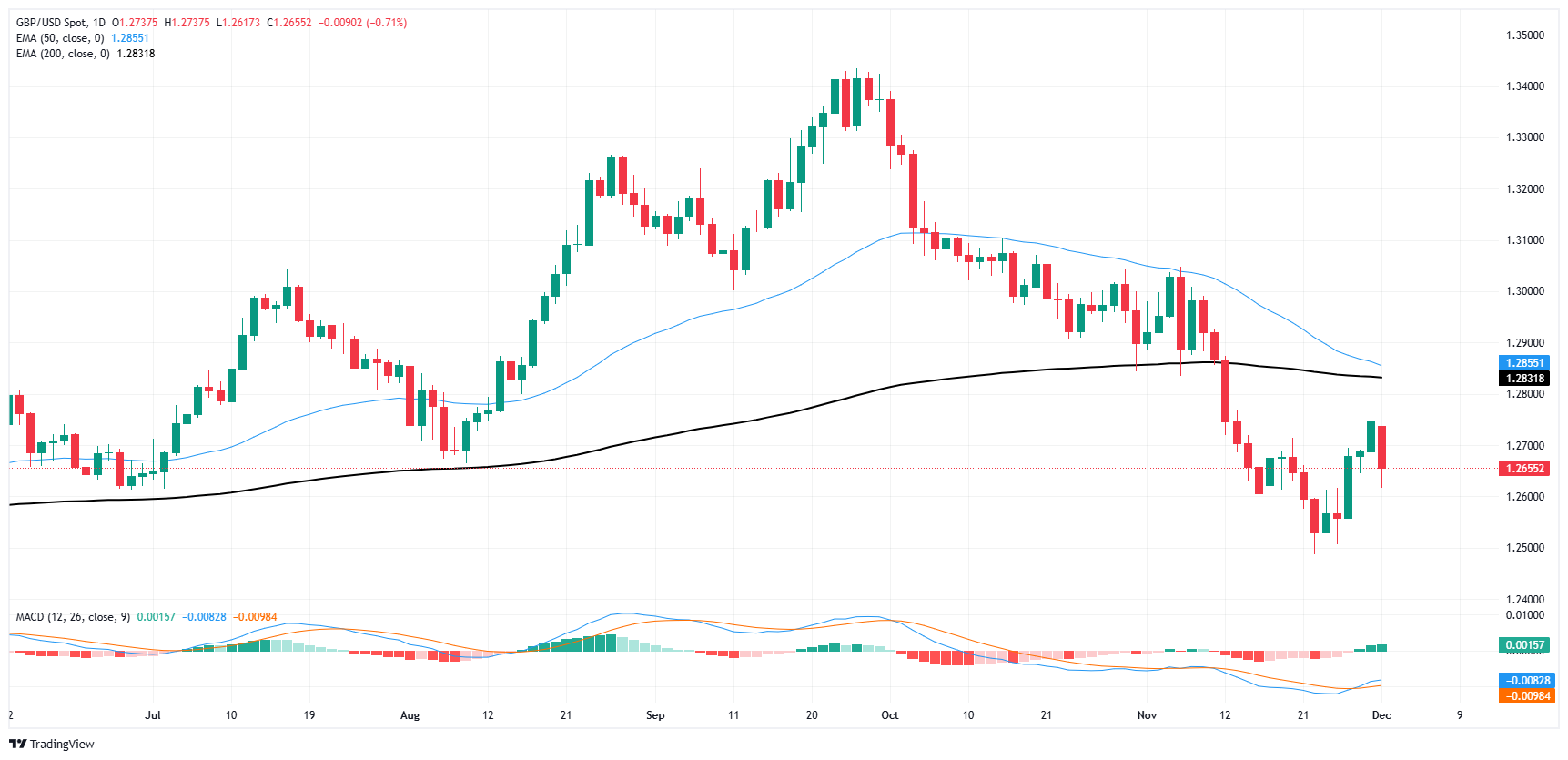- Analytics
- News and Tools
- Market News
- GBP/USD turns bearish, ends three-day winstreak
GBP/USD turns bearish, ends three-day winstreak
- GBP/USD fell 0.7% on Monday to fall back below 1.2700.
- A lack of UK data left the Greenback front and center.
- US PMI data came in better than expected, but still below contraction level.
GBP/USD backslid below the 1.2700 handle on Monday, kicking off the new trading week by snapping a three-day winning streak and keeping Cable on the low side of the 200-day Exponential Moving Average (EMA). The data docket was clear on the UK side, leaving markets to roil after US Purchasing Managers Index (PMI) figures popped higher but still remained in contraction territory below 50.0.
Another US Nonfarm Payrolls (NFP) week is underway, and the economic calendar is littered with plenty of US jobs preview figures in the runup to Friday’s bumper job additions report. UK data releases are limited this week, although Bank of England (BoE) Governor Andrew Bailey will be making an appearance on Wednesday via a pre-recorded interview at an event hosted by the Financial Times.
US ISM Manufacturing PMI figures rose in November, climbing to a five-month high of 48.4 versus the previous 46.5, over and above the forecast 47.5. Despite the uptick in business expectation survey results, the indicator is still stuck in contraction territory below 50.0, implying the majority of business operators still see declines in overall activity in the coming months.
GBP/USD price forecast
Monday’s declines dragged GBP/USD back below the 1.2700 handle, keeping price action on the bearish side of the 200-day EMA, which is still rolling over into bearish territory near 1.2800. Cable caught a near-term bounce from multi-month lows after declining into 1.2500, but topside momentum remains limited.
GBP/USD daily chart
Pound Sterling FAQs
The Pound Sterling (GBP) is the oldest currency in the world (886 AD) and the official currency of the United Kingdom. It is the fourth most traded unit for foreign exchange (FX) in the world, accounting for 12% of all transactions, averaging $630 billion a day, according to 2022 data. Its key trading pairs are GBP/USD, also known as ‘Cable’, which accounts for 11% of FX, GBP/JPY, or the ‘Dragon’ as it is known by traders (3%), and EUR/GBP (2%). The Pound Sterling is issued by the Bank of England (BoE).
The single most important factor influencing the value of the Pound Sterling is monetary policy decided by the Bank of England. The BoE bases its decisions on whether it has achieved its primary goal of “price stability” – a steady inflation rate of around 2%. Its primary tool for achieving this is the adjustment of interest rates. When inflation is too high, the BoE will try to rein it in by raising interest rates, making it more expensive for people and businesses to access credit. This is generally positive for GBP, as higher interest rates make the UK a more attractive place for global investors to park their money. When inflation falls too low it is a sign economic growth is slowing. In this scenario, the BoE will consider lowering interest rates to cheapen credit so businesses will borrow more to invest in growth-generating projects.
Data releases gauge the health of the economy and can impact the value of the Pound Sterling. Indicators such as GDP, Manufacturing and Services PMIs, and employment can all influence the direction of the GBP. A strong economy is good for Sterling. Not only does it attract more foreign investment but it may encourage the BoE to put up interest rates, which will directly strengthen GBP. Otherwise, if economic data is weak, the Pound Sterling is likely to fall.
Another significant data release for the Pound Sterling is the Trade Balance. This indicator measures the difference between what a country earns from its exports and what it spends on imports over a given period. If a country produces highly sought-after exports, its currency will benefit purely from the extra demand created from foreign buyers seeking to purchase these goods. Therefore, a positive net Trade Balance strengthens a currency and vice versa for a negative balance.
© 2000-2026. All rights reserved.
This site is managed by Teletrade D.J. LLC 2351 LLC 2022 (Euro House, Richmond Hill Road, Kingstown, VC0100, St. Vincent and the Grenadines).
The information on this website is for informational purposes only and does not constitute any investment advice.
The company does not serve or provide services to customers who are residents of the US, Canada, Iran, The Democratic People's Republic of Korea, Yemen and FATF blacklisted countries.
Making transactions on financial markets with marginal financial instruments opens up wide possibilities and allows investors who are willing to take risks to earn high profits, carrying a potentially high risk of losses at the same time. Therefore you should responsibly approach the issue of choosing the appropriate investment strategy, taking the available resources into account, before starting trading.
Use of the information: full or partial use of materials from this website must always be referenced to TeleTrade as the source of information. Use of the materials on the Internet must be accompanied by a hyperlink to teletrade.org. Automatic import of materials and information from this website is prohibited.
Please contact our PR department if you have any questions or need assistance at pr@teletrade.global.















